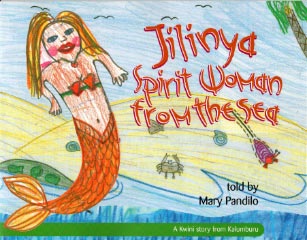Kimberley Languages Resource Centre’s introduction to the book says: Language tells us who we are. Language reminds us of our responsibilities within our society and the proper way to do things. Language reminds us of where we have come from. Language makes us feel proud and strong and helps us understand, so we can know.
Author Mary Pandilo, also known as Rurruwala, could sing in Kwini, Gaambera, Spanish and Latin. Being 'in Kwini country and eating bush foods inspired Mary to tell the stories and brought back memories of some she had not told in Kwini for years.'
This is an easy bilingual reader: Kwini language text on the verso of each spread and English on the recto, so that neither language is privileged. Key vocabulary words are set in an orange-coloured text box to the side so children can learn individual words. A verbatim transcription of Mary’s original telling is given in the back of the book, as well as a pronunciation guide.
Students of Kalumburu Remote Community School have depicted Jilinya in her imagined spirit forms. On the cover she is a perky Busby Berkeley blonde mermaid, beckoning the reader into the book, where she appears in various shapes, sizes and colours as she hunts sea creatures to eat. She morphs into a vampiric long-clawed crab, waiting behind a rock to pounce. 'Maybe she is looking out at us now?' Mary asks. The children have created a coloured pencil beach alongside the Indian Ocean, as a background to all the spreads, to provide a good visual link between the different Jilinyas.
As Mary says, Kuluwardi keji (tr: That’s the end of my story).

